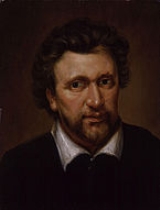
dramatist, poet and actor. A contemporary of William Shakespeare
, he is best known for his satirical
plays, particularly Volpone
, The Alchemist
, and Bartholomew Fair, which are considered his best, and his lyric
poems. A man of vast reading and a seemingly insatiable appetite for controversy, Jonson had an unparalleled breadth of influence on Jacobean and Caroline playwrights and poets.
Jonson claimed his family was of Scottish
Border country
descent, and this claim may have been supported by the fact that his coat of arms
bears three spindles or rhombi
, a device shared by a Borders family, the Johnstones of Annandale
.
There shall be no love lost.![]()
Slow, slow, fresh fount, keep time with my salt tears:Yet, slower, yet; O faintly, gentle springs:List to the heavy part the music bears,Woe weeps out her division, when she sings.Droop herbs, and flowers,Fall grief in showers,Our beauties are not ours;O, I could still,Like melting snow upon some craggy hill,Drop, drop, drop, drop,Since nature's pride is now, a withered daffodil.![]()
True happinessConsists not in the multitude of friends,But in the worth and choice.![]()
Queen and huntress, chaste and fair,Now the sun is laid to sleep,Seated in thy silver chair,State in wonted manner keep:Hesperus entreats thy light,Goddess, excellently bright.![]()
That old bald cheater, Time.![]()
Of all wild beasts preserve me from a tyrant; and of all tame, a flatterer.![]()
The world knows only two,—that's Rome and I.![]()
Calumnies are answered best with silence.![]()
You that would last long, list to my song,Make no more coil, but buy of this oil.Would you be ever fair and young?Stout of teeth and strong of tongue?Tart of palate, quick of ear?Sharp of sight, of nostril clear?Moist of hand and light of foot?(Or, I will come nearer to it)Would you live free from all diseases,Do the act your mistress pleases;Yet fright all aches from your bones?Here's a medicine for the nones.![]()
Preserving the sweetness of proportion and expressing itself beyond expression.![]()

